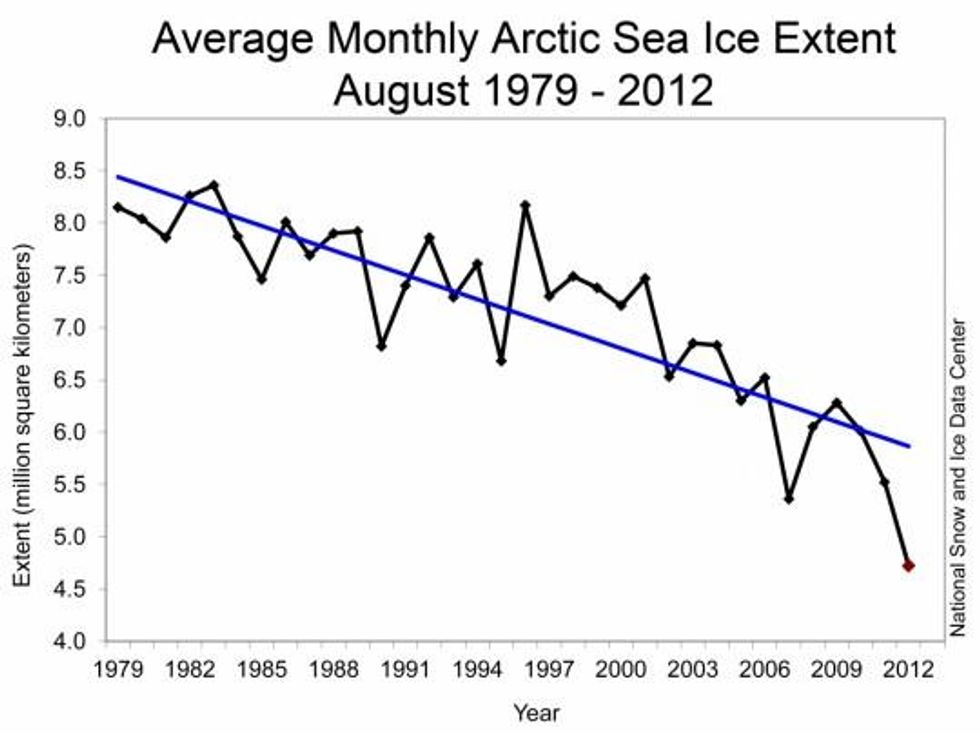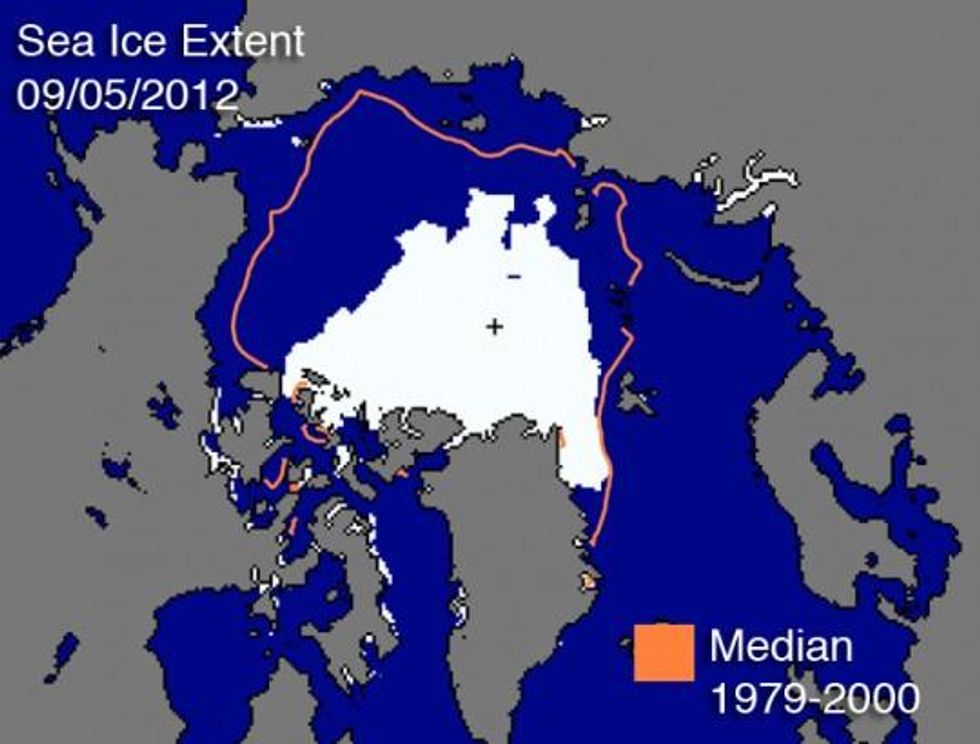

SUBSCRIBE TO OUR FREE NEWSLETTER
Daily news & progressive opinion—funded by the people, not the corporations—delivered straight to your inbox.
5
#000000
#FFFFFF
To donate by check, phone, or other method, see our More Ways to Give page.


Daily news & progressive opinion—funded by the people, not the corporations—delivered straight to your inbox.
The rate of Arctic Sea ice melt has caught scientists by surprise, leaving them to describe the current record low levels as "amazing," "a Goliath" and "unprecedented." While a record low was recorded on Aug. 26, the ice level continues to fall, and the National Snow and Ice Data Center reports that there is still a week left in the melting season.
The speed of the Arctic ice melt is astounding, scientists say. "It is a greater change than we could even imagine 20 years ago, even 10 years ago," Dr. Kim Holmen, international director of the Norwegian Polar Institute told the BBC. "And it has taken us by surprise and we must adjust our understanding of the system and we must adjust our science and we must adjust our feelings for the nature around us."
"This year's melting season is a Goliath," also notes geophysicist Marco Tedesco, director of the Cryospheric Processes Laboratory at City University of New York, the Wall Street Journal reports. "The ice is being lost at a very strong pace."
These scientists' opinions are no anomalies.
Weather Underground co-founder Dr. Jeff Masters writes that "Every major scientific institution that tracks Arctic sea ice agrees that new records for low ice area, extent, and volume have been set. These organizations include the University of Washington Polar Science Center (a new record for low ice volume), the Nansen Environmental & Remote Sensing Center in Norway, and the University of Illinois Cryosphere Today."
The National Snow and Ice Data Center illustrates the melt since 1979 in the graph below, showing a decline in the ice extent at 10.2% per decade:

Masters adds that the Arctic melt level record might go back even further. "Satellite records of sea ice extent date back to 1979, though a 2011 study by Kinnard et al. shows that the Arctic hasn't seen a melt like this for at least 1,450 years," writes Masters.
Another scientist with the Norwegian Polar Institute engaged in Arctic research, Dr. Edmond Hansen, confirms the historic levels of the ice melt, and tells the BBC it is "amazing."
"As a scientist, I know that this is unprecedented in at least as much as 1,500 years. It is truly amazing -- it is a huge dramatic change in the system."
"This is not some short-lived phenomenon -- this is an ongoing trend. You lose more and more ice and it is accelerating -- you can just look at the graphs, the observations, and you can see what's happening," Hansen said.
Masters notes that the ice melt has real impacts on the climate, since the white snow and ice reflect sunlight while the ocean absorbs it. As the ice melts and we have more sea, we create "a recipe for more and faster global warming," writes Masters.

Dear Common Dreams reader, The U.S. is on a fast track to authoritarianism like nothing I've ever seen. Meanwhile, corporate news outlets are utterly capitulating to Trump, twisting their coverage to avoid drawing his ire while lining up to stuff cash in his pockets. That's why I believe that Common Dreams is doing the best and most consequential reporting that we've ever done. Our small but mighty team is a progressive reporting powerhouse, covering the news every day that the corporate media never will. Our mission has always been simple: To inform. To inspire. And to ignite change for the common good. Now here's the key piece that I want all our readers to understand: None of this would be possible without your financial support. That's not just some fundraising cliche. It's the absolute and literal truth. We don't accept corporate advertising and never will. We don't have a paywall because we don't think people should be blocked from critical news based on their ability to pay. Everything we do is funded by the donations of readers like you. Will you donate now to help power the nonprofit, independent reporting of Common Dreams? Thank you for being a vital member of our community. Together, we can keep independent journalism alive when it’s needed most. - Craig Brown, Co-founder |
The rate of Arctic Sea ice melt has caught scientists by surprise, leaving them to describe the current record low levels as "amazing," "a Goliath" and "unprecedented." While a record low was recorded on Aug. 26, the ice level continues to fall, and the National Snow and Ice Data Center reports that there is still a week left in the melting season.
The speed of the Arctic ice melt is astounding, scientists say. "It is a greater change than we could even imagine 20 years ago, even 10 years ago," Dr. Kim Holmen, international director of the Norwegian Polar Institute told the BBC. "And it has taken us by surprise and we must adjust our understanding of the system and we must adjust our science and we must adjust our feelings for the nature around us."
"This year's melting season is a Goliath," also notes geophysicist Marco Tedesco, director of the Cryospheric Processes Laboratory at City University of New York, the Wall Street Journal reports. "The ice is being lost at a very strong pace."
These scientists' opinions are no anomalies.
Weather Underground co-founder Dr. Jeff Masters writes that "Every major scientific institution that tracks Arctic sea ice agrees that new records for low ice area, extent, and volume have been set. These organizations include the University of Washington Polar Science Center (a new record for low ice volume), the Nansen Environmental & Remote Sensing Center in Norway, and the University of Illinois Cryosphere Today."
The National Snow and Ice Data Center illustrates the melt since 1979 in the graph below, showing a decline in the ice extent at 10.2% per decade:

Masters adds that the Arctic melt level record might go back even further. "Satellite records of sea ice extent date back to 1979, though a 2011 study by Kinnard et al. shows that the Arctic hasn't seen a melt like this for at least 1,450 years," writes Masters.
Another scientist with the Norwegian Polar Institute engaged in Arctic research, Dr. Edmond Hansen, confirms the historic levels of the ice melt, and tells the BBC it is "amazing."
"As a scientist, I know that this is unprecedented in at least as much as 1,500 years. It is truly amazing -- it is a huge dramatic change in the system."
"This is not some short-lived phenomenon -- this is an ongoing trend. You lose more and more ice and it is accelerating -- you can just look at the graphs, the observations, and you can see what's happening," Hansen said.
Masters notes that the ice melt has real impacts on the climate, since the white snow and ice reflect sunlight while the ocean absorbs it. As the ice melts and we have more sea, we create "a recipe for more and faster global warming," writes Masters.

The rate of Arctic Sea ice melt has caught scientists by surprise, leaving them to describe the current record low levels as "amazing," "a Goliath" and "unprecedented." While a record low was recorded on Aug. 26, the ice level continues to fall, and the National Snow and Ice Data Center reports that there is still a week left in the melting season.
The speed of the Arctic ice melt is astounding, scientists say. "It is a greater change than we could even imagine 20 years ago, even 10 years ago," Dr. Kim Holmen, international director of the Norwegian Polar Institute told the BBC. "And it has taken us by surprise and we must adjust our understanding of the system and we must adjust our science and we must adjust our feelings for the nature around us."
"This year's melting season is a Goliath," also notes geophysicist Marco Tedesco, director of the Cryospheric Processes Laboratory at City University of New York, the Wall Street Journal reports. "The ice is being lost at a very strong pace."
These scientists' opinions are no anomalies.
Weather Underground co-founder Dr. Jeff Masters writes that "Every major scientific institution that tracks Arctic sea ice agrees that new records for low ice area, extent, and volume have been set. These organizations include the University of Washington Polar Science Center (a new record for low ice volume), the Nansen Environmental & Remote Sensing Center in Norway, and the University of Illinois Cryosphere Today."
The National Snow and Ice Data Center illustrates the melt since 1979 in the graph below, showing a decline in the ice extent at 10.2% per decade:

Masters adds that the Arctic melt level record might go back even further. "Satellite records of sea ice extent date back to 1979, though a 2011 study by Kinnard et al. shows that the Arctic hasn't seen a melt like this for at least 1,450 years," writes Masters.
Another scientist with the Norwegian Polar Institute engaged in Arctic research, Dr. Edmond Hansen, confirms the historic levels of the ice melt, and tells the BBC it is "amazing."
"As a scientist, I know that this is unprecedented in at least as much as 1,500 years. It is truly amazing -- it is a huge dramatic change in the system."
"This is not some short-lived phenomenon -- this is an ongoing trend. You lose more and more ice and it is accelerating -- you can just look at the graphs, the observations, and you can see what's happening," Hansen said.
Masters notes that the ice melt has real impacts on the climate, since the white snow and ice reflect sunlight while the ocean absorbs it. As the ice melts and we have more sea, we create "a recipe for more and faster global warming," writes Masters.
